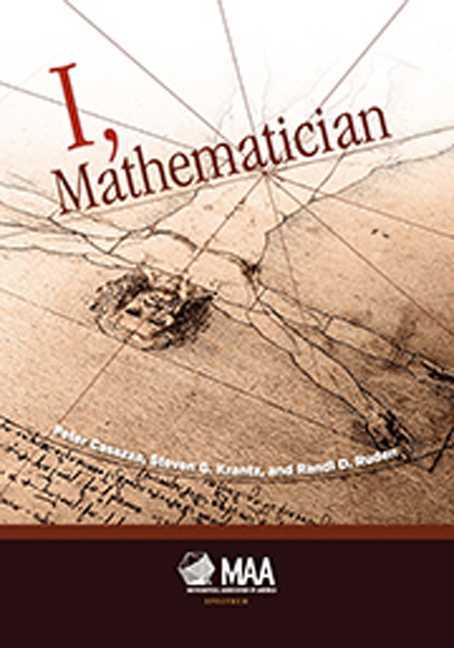Book contents
- Frontmatter
- Contents
- Preface
- Part 1 Who Are Mathematicians?
- Foreword to Who Are Mathematicians?
- 1 Mathematicians and Mathematics
- 2 What Are Mathematicians Really Like? Observations of a Spouse
- 3 Mathematics: Art and Science
- 4 A Mathematician's Survival Guide
- 5 We Are Different
- 6 The Naked Lecturer
- 7 Through a Glass Darkly
- 8 What's a Nice Guy Like Me Doing in a Place Like This?
- 9 A Mathematician's Eye View
- 10 I am a Mathematician
- Part II On Becoming a Mathematician
- Part III Why I Became a Mathematician
6 - The Naked Lecturer
from Part 1 - Who Are Mathematicians?
- Frontmatter
- Contents
- Preface
- Part 1 Who Are Mathematicians?
- Foreword to Who Are Mathematicians?
- 1 Mathematicians and Mathematics
- 2 What Are Mathematicians Really Like? Observations of a Spouse
- 3 Mathematics: Art and Science
- 4 A Mathematician's Survival Guide
- 5 We Are Different
- 6 The Naked Lecturer
- 7 Through a Glass Darkly
- 8 What's a Nice Guy Like Me Doing in a Place Like This?
- 9 A Mathematician's Eye View
- 10 I am a Mathematician
- Part II On Becoming a Mathematician
- Part III Why I Became a Mathematician
Summary
Now that I have your attention, I would like to to write about mathematics lecturing. If readers are annoyed by my confusing the pronouns “you,” “one,” “she” and “he,” they should remember that I think of myself as addressing an audience of mathematicians and non-mathematicians. The non-mathematicians are rather shadowy creatures, but the mathematicians have clear characters and include both men and women.
Lecture Courses
For most mathematicians lecturing is part of their job. A few mathematicians grudge every moment of teaching as a moment taken from their research. Of course, teaching may occasionally aid research. Conway lectured on the construction of the real numbers starting with naive set theory, giving a different version of the standard constructions each year. I suspect that he would not have produced the theory of surreal numbers if he had not given those lectures.When I lectured on elementary functional analysis, I would always close the section on Baire's category theorem by saying that, almost certainly, many variations on the ideas remained to be exploited. Later I came across one such variation. Even so, it is reasonable to suppose that, in general, the more effort devoted to teaching, the less effort is devoted to research.
In spite of this, most mathematicians do not regret the time they spend teaching. In part, this reflects a feeling that, having been well taught ourselves, it is our duty to give back something of what we owe. In part, it reflects the fact that research is, on the whole, a lonely occupation and teaching is a social one. In Eastern Europe under communism, politically suspect mathematicians might be moved from teaching universities to research-only institutes with the move intended as a punishment and felt as such. Mainly, I think, mathematicians like to lecture for the reasons outlined in Surely You're Joking, Mr. Feynman!. If you only do research, then a year without a good idea is a wasted year. If you do research and teaching, then, no matter how the research has gone, you will have done something useful. Finally, most people, even mathematicians, have an extrovert side.
- Type
- Chapter
- Information
- I, Mathematician , pp. 60 - 70Publisher: Mathematical Association of AmericaPrint publication year: 2015



